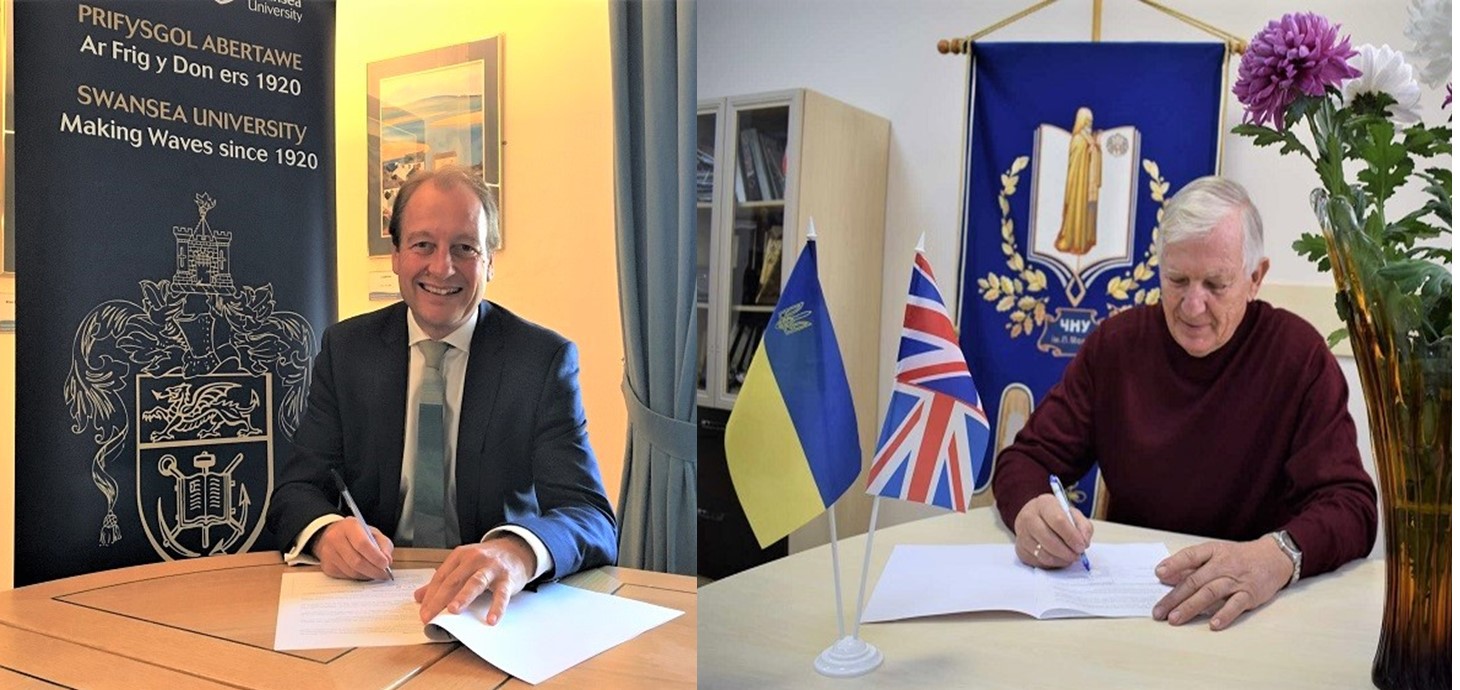
Professor Paul Boyle in Swansea (left) and Professor Leonid Klymenko (right) in Mykolaiv, sign the agreement between their two universities. It outlines the framework for collaboration, including research and academic partnerships.
Swansea University has signed a twinning agreement with a Ukrainian university that paves the way for research partnerships, sharing online teaching and learning materials, and opportunities for students and staff from Ukraine to visit Swansea.
The agreement is with Petro Mohyla Black Sea National University (PMBSNU), which is in the region of Mykolaiv, a major port city of around 470,000 people in southern Ukraine.
The agreement was signed by the heads of the two universities in a coordinated ceremony held simultaneously in Swansea and Mykolaiv on Thursday 3 November.
It is the latest in a series of partnerships between UK and Ukrainian universities, set up by umbrella body Universities UK International and the Cormack Consultancy Group to support the country in the wake of the invasion by Russian forces in February.
These partnerships are intended to encourage the sharing of resources and support in a collective gesture of solidarity and reciprocity to help Ukrainian institutions, staff and students.
In Wales, Global Wales opened funding of up to £15,000 per university to facilitate academic support initiatives with Ukraine. It is hoped that these will develop into long-term collaborative partnerships between the universities involved.
PMBSNU is a state higher educational institution governed by the Ministry of Education and Science of Ukraine. With around 5000 students, it traces its origins back to 1996 and became a national level university in 2016.
It has faculties in law, political sciences, computer science, journalism, physical education and sport, economic sciences and philology, along with medical, education and public administration institutes. It makes wide use of Western educational technologies and its working languages are Ukrainian and English.
Like Swansea, PMBSNU places strong emphasis on international links. It already has partnerships with universities in Canada, China and the USA, and in all corners of Europe, from Cadiz in southern Spain to Bodo in northern Norway. PMBSNU also takes part in a wide range of international exchange programs including Erasmus and the Fulbright scholarships, and more than 200 overseas staff have given lectures at the university.
Find out more about Petro Mohyla Black Sea National University
The new agreement is a Memorandum of Understanding between the two universities. It outlines the framework for collaboration, including research and academic partnerships.
The first step will be opportunities for students and staff at PMBSNU to visit Swansea University for work and study. Swansea has welcomed three students from PMBSNU this semester and looks forward to more joining for the spring semester.
Staff from PMBSNU also took part virtually – via live streams and chat - in the annual conference organised by the Swansea Academy for Learning and Teaching (SALT), which is based at the University.
Professor Paul Boyle, Swansea University Vice Chancellor, said:
“At Swansea University, we are proud of our enduring commitment to embracing partnership and collaboration across countries, disciplines and sectors.
“In these most challenging of times for our colleagues at Petro Mohyla Black Sea National University, we are proud to commit to this agreement, which binds Swansea and Mykolaiv and supports our institutions’ mutual belief that academic collaboration which transcends national borders is critical to our shared future.”
Professor Leonid Klymenko, Rector of Petro Mohyla Black Sea National University, said:
“It is very important to us to develop our international connections and relations with European universities, especially in Great Britain and Wales because Great Britain has been one of our best friends in the war against the Russian invasion. We are going to continue and maintain our cooperation.
In Mykolaiv even when missiles were being dropped on our city, we continued our work and our study process. In this difficult situation we stand strong.
We hope that in the future we will have an opportunity to visit your university and we will welcome your delegation to our university. It will be to our mutual benefit to co-operate.”
Jeremy Miles, Welsh Government Minister for Education and Welsh Language, said:
“Wales is doing everything it can to support the people of Ukraine through this difficult time. Education has no boundaries and I’m really pleased to see our Welsh universities extending the hand of friendship to their Ukrainian colleagues.”
Swansea University is also exploring ways of providing support for students and members of staff from other Ukrainian universities.
Members of staff at Swansea are also involved in community initiatives to support Ukraine. For example, Dr Dmitri Finkelshtein, associate professor of mathematics, is the chair of Sunflowers Wales, a non-profit community group organised by Ukrainian volunteers in Wales to support Ukrainians affected by Russia’s invasion.
"We stand with the people of Ukraine" - Vice-Chancellor's statement on invasion of Ukraine
